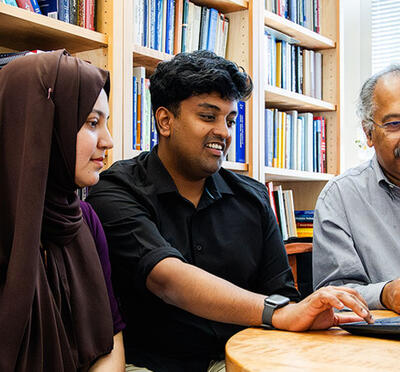OREGON STATE ENGINEER FINDS SUCCESS THROUGH SOLID COMMUNICATIONS
When Don Fuller (’72 B.S., Electrical Engineering) looks back over a long, successful career to his days at the College of Engineering, they blur together in misty nostalgia. But even now, nearly 50 years after graduating, one course remains unforgettable: Communications for Engineers.
“It was my favorite and most memorable class in four years of studying engineering. It just stuck with me, and I used what I learned all the time,” said Fuller, the director of strategic alliances for the California Independent System Operator, which manages the flow of electricity supplying 80% of the state’s power grid and serves 30 million Californians. “I realized right after I started my career that the concepts from that course were important.
Most important of all was to adjust my message for the people I’m addressing so they fully absorb and understand what I’m saying.
Fuller meets often with varied audiences — consumers, regulators, and representatives from the numerous utilities served by the ISO. For each group, he asks himself the best way to make his presentation engaging and clear. “Communicating with engineers at a utility is totally different than with policymakers and state regulators,” he said, “and most consumers don’t know all that much about how the power grid operates. They hear words like high voltage, megawatt, and load, but those terms are often misunderstood by laypeople. I want to make sure they understand.”
Informal, day-to-day exchanges are no different. “The situation doesn’t matter,” Fuller added. “I want to use words that work. Sometimes, it’s like teaching.”
Fuller has lost count of the meetings and presentations where engineers rambled on in specialized, complex language to people who were not technically savvy. “Just like professionals in many technical fields, engineers love their acronyms and their jargon,” he said. “That’s fine when we’re talking with our peers, but I’m notorious for interrupting a presentation to ask the speaker to stop and clarify what they just said or explain an acronym. I know perfectly well what they said, but I also know when the audience is scratching their heads and maybe embarrassed to ask.”
The course itself was developed and taught by a journalism instructor, according to Fuller. He had been a science reporter for a major weekly news magazine during the early years of the space program, but he was constantly frustrated by the engineers and rocket scientists he interviewed who couldn’t explain what they did in plain language. “Our teacher wanted us to be better.” Fuller said.
After reading (in previous issues of this alumni magazine) about engineering students doing fascinating work, Fuller wondered if they’re equally prepared to formulate clear, concise summaries of their research, and why it’s important beyond the lab. “In any job, that skill becomes so valuable when you’re trying to promote your ideas, or seek grant money, or gain support from managers who don’t grasp the nature of what you’re doing,” he said. “When I was a student, communications wasn’t emphasized in the engineering curriculum, but it should be. The mindset I developed from that class became second nature and guided me throughout my career, and what I learned has contributed a great deal to my achievements.”


